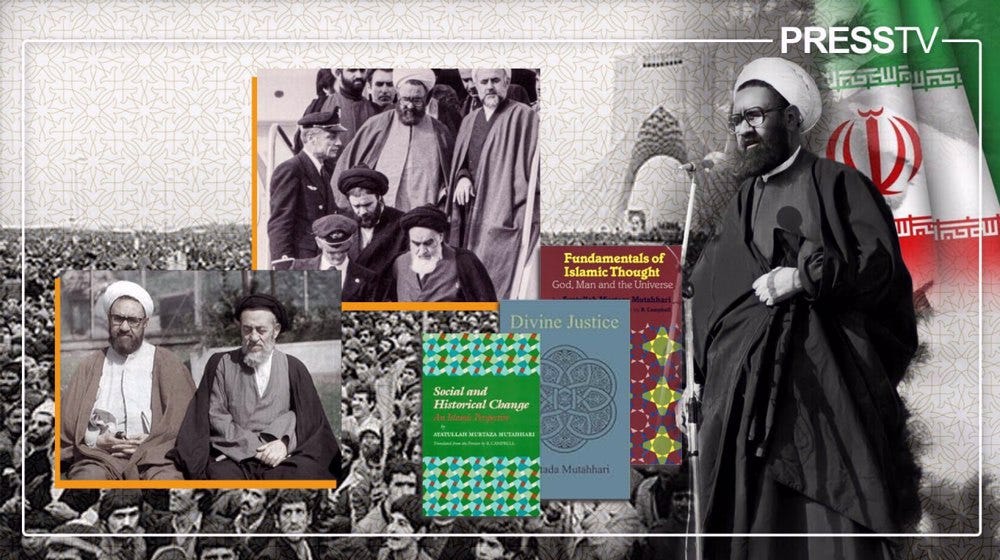Remembering Ayatollah Motahhari: Architect of Revolutionary Thought
A visionary scholar's enduring legacy of Islamic philosophy, education, and advocacy for Palestine.
Ayatollah Morteza Motahhari, a prominent Islamic scholar, philosopher, and author, is remembered as a key architect of revolutionary thought in Iran. He is buried in a peaceful corner of the shrine of Fatimeh Masumeh in Qom, a site frequently visited by scholars and religious figures from around the world.
Born on February 2, 1920, in the small town of Fariman near Mashhad, Motahhari was raised in a scholarly environment. His father, Muhammad Husain Motahhari, was a respected religious scholar who had studied in Najaf and spent time in Egypt and Saudi Arabia before returning to Iran. Under his father’s guidance, Motahhari began his religious education early, dedicating one of his most famous works, “Dastan-e-Rastan” (“The Epic of the Righteous”), to his father. This book was recognized as the Book of the Year by the Iranian National Commission for UNESCO in 1965.
At just 12 years old, Motahhari started formal studies in Mashhad, quickly developing a passion for philosophy, theology, and mysticism. He later recalled that even as a young student, he was more inspired by philosophers and theologians than by scientists or inventors, seeing them as heroes of thought.
Motahhari became a prolific writer, producing numerous books that clarified Islamic ideology for younger generations, especially during the Pahlavi era when Western ideas were gaining influence. He played a crucial role in bridging the gap between traditional religious seminaries and university students.
Ayatollah Khamenei, the current Leader of the Islamic Revolution, has praised Motahhari’s intelligence, clarity, and realism, noting that his writings and research are remarkable contributions to Islamic literature.
Motahhari’s close relationship with Imam Khomeini, the leader of the Islamic Revolution, was marked by deep respect and spiritual kinship. After Motahhari’s assassination in 1979 by a member of the Furqan group, Imam Khomeini mourned him as a beloved son and an irreplaceable figure in Islam. Motahhari had first met Khomeini as a young lecturer in Qom, and their intellectual and spiritual bond grew over twelve years of study and collaboration.
Motahhari was also a dedicated teacher. He began teaching philosophy at the University of Tehran in 1954, a position he held for 22 years. He was instrumental in founding the Husayniya-e-Irshad, an institute aimed at spreading Islamic thought among educated youth, and his lectures attracted large audiences. However, his public lectures were eventually banned by the Pahlavi regime, and he was dismissed from his university post. After a visit to Najaf to meet Imam Khomeini, Motahhari returned to Iran and became a leading advocate for the revolutionary movement.
Motahhari was an early and vocal supporter of the Palestinian cause, viewing Zionism as an extension of Western colonialism and oppression. In 1970, he opened a bank account to collect donations for Palestinians, defying the Pahlavi regime’s pro-Israel stance. He believed that supporting Palestine was a religious duty for all Muslims, a principle that continues to influence Iran’s foreign policy today.
Ayatollah Motahhari’s legacy endures through his writings, his students, and the ongoing observance of Teachers’ Day in Iran, which commemorates his martyrdom and lifelong dedication to education and justice.
In a speech following the 1979 assassination of Ayatollah Motahari, the founder of the Islamic Republic of Iran, Imam Khomeini, said,
"By assassinating our great personalities, the truthfulness of our Islam is confirmed."
“Kill us! Our nation will awaken even more.”
On May 1, 1979, one of Iran's leading Islamic scholars Ayatollah Morteza Motahari was martyred by Forqan Group in Tehran. The day after his martyrdom (May 2) was designated Teachers' Day in the country. The event is observed nationwide, especially at educational institutions.
Reference: PressTv


